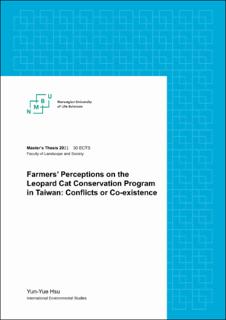| dc.description.abstract | The leopard cat (Prionailurus bengalensis) is one of the small felines commonly distributed in Asia, and it once widely inhabited low altitude areas below 1,500 metres. However, with the current population plummeting and the distribution areas unclear, it has been classified as an endangered species by Taiwanese government. A community-based conservation program, the “Leopard Cat Rice” program was established in 2014, which aimed to change the locals’ perceptions about the leopard cat and restore its habitat. This program underwent structural changes in 2019.
This research aimed to clarify the factors that influence the local farmers to participate in the program, and utilised semi-structured interviews to survey local farmers in Tungshiau Township, located in Miaoli County. A social enterprise and NGOs were also included in pilot interviews to provide insight and knowledge related to the development and implementation of the program. The interviews in this research were conducted with five local farmers, the leopard cat conservation scholar and the technical specialist, who are all the initiators of the program. The results showed that the participating farmers’ perceptions toward the program have acted as the main factors to influence their decision, followed by the livelihood implication and motivation. During the implementation of the program, if the participating farmers had personal autonomy in making farming-related decisions and maintained an open communication channel with the managerial authority, they would still maintain their contributions to the program, regardless of the impact on their livelihoods induced by the participation. In short, the participating farmers’ perceptions towards the program depended on whether they had the right and power to participate in the decision making process and implementation of the entire program. | en_US |

